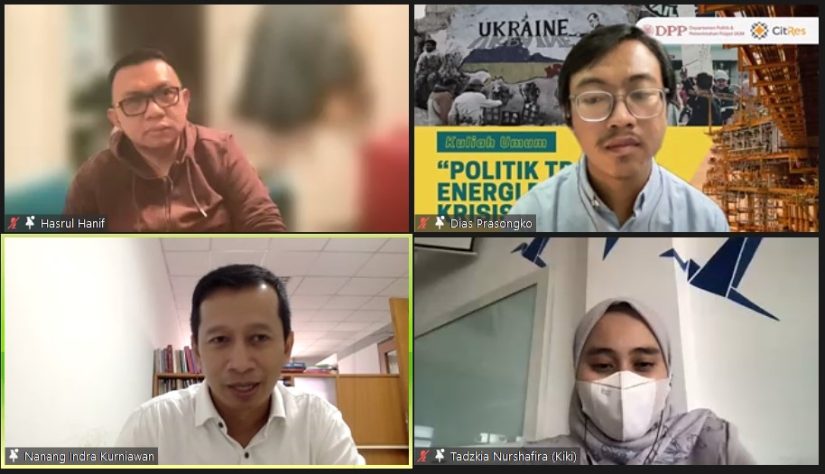
Yogyakarta, March 2nd 2022─The Department of Politics and Government (DPP) Fisipol UGM collaborated with Citizen Engagement, Transparency & Transnational Natural Resource Governance (CitRes) to hold a public lecture with the title “The Politics of Energy Transition and the Ukrainian Crisis”. The speakers, which consisted of lecturers from DPP Fisipol UGM and researchers from CItRes, talked about the political side of the EU’s effort in transitioning their energy which affects the EU’s stance towards Russia’s invasion in Ukraine that started last February until now. Nanang Indra Kurniawan, a DPP lecturer, explained that the effort to lower carbon emission under the Net Zero 2050 vision means that the EU needs gas supplies from Russia and Norway to fulfill their energy needs. Both of those countries play an important role in sustaining the EU’s energy transition. On the other hand, EU citizens’ energy consumption also increased during the Covid-19 pandemic. Therefore, even though renewable energy is already developed in Europe, that energy is still unable to sustain the energy consumption needs in the region.
“Europe’s interest is in developing their economy in the post-pandemic era. However, that can’t be done if there isn’t enough energy. Unfortunately, the energy supply is mainly based in Russia and Norwegia,” Nanang said.
In line with what Nanang explained, a CitRes researcher, Tadzkia Nurshafira, also said that Europe’s diplomatic bargaining power is weaker during Russia’s invasion of Ukraine because of the EU’s dependency on Russia’s gas. According to Tadzkia, generally, the Ukraine crisis shows the different ways of defining gas. Gas can be defined as a useful political tool to increase Russia’s bargaining power in the Russian conflict. However, at the same time in the EU, there is also a dualism in the perception of gas.
“Gas which was once seen as a solution for EU energy transition is now seen as a problem,” Tadzkia said.
Another DPP lecturer, Hasrul Hanif, said that the process of the energy transition is actually a very political process in the context of an interdependent world. According to Hasrul, in several cases, invasion is meant to secure the domestic energy supply. There are countries that use their energy resources for international politics or geopolitics purposes. One of the strategies adopted by these countries is by manipulating the flow of energy.
“Russia has long used gas as a way to maintain ex-Soviet countries’ loyalty and Russia also has a tendency to give discounts for countries who are pro-Russia such as Belarus and Armenia,” Hasrul said.
This public lecture was attended by more than a hundred people through Zoom and the event was broadcasted through DPP Fisipol UGM’s YouTube channel. The recording of this public lecture can still be watched through this link.
